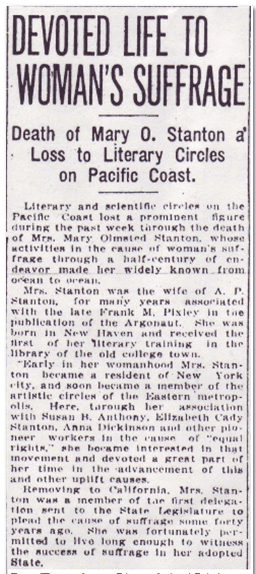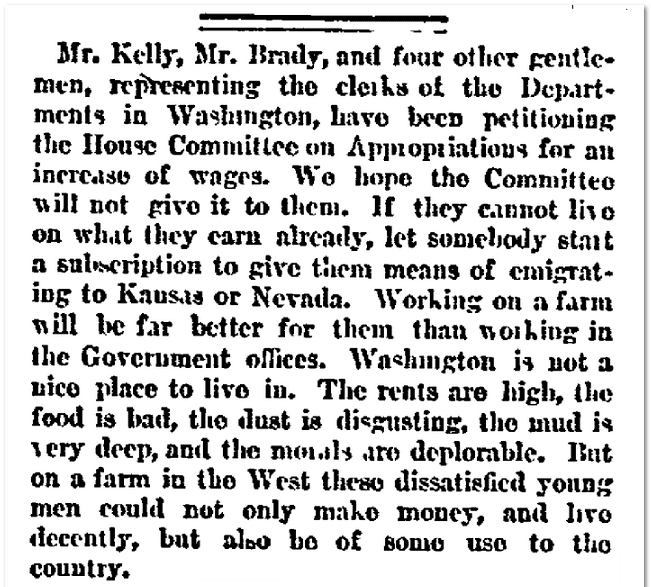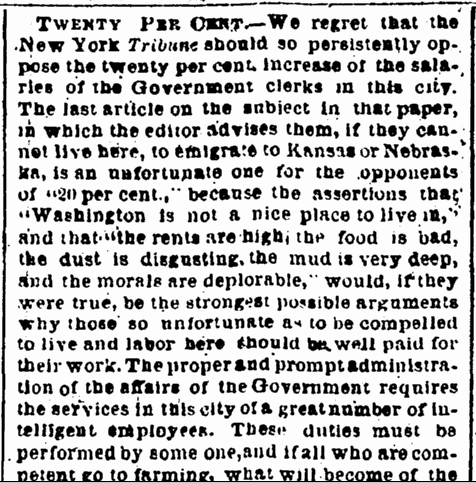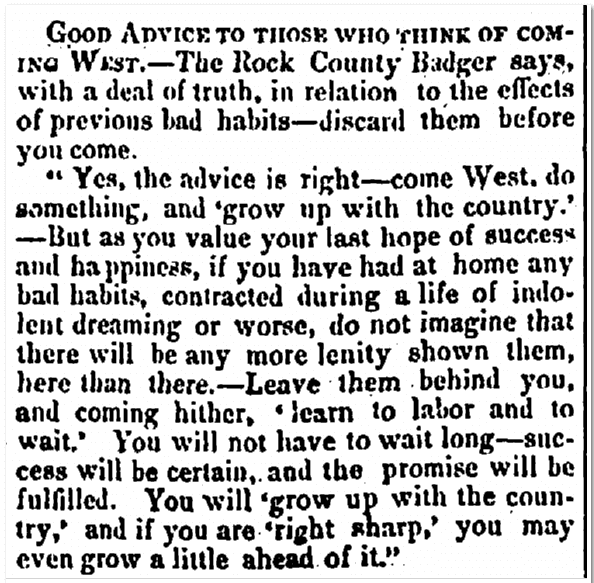Introduction: Mary Harrell-Sesniak is a genealogist, author and editor with a strong technology background. In this guest blog post, Mary explains how research on her ancestor led her to investigate if Horace Greeley really said “Go West young man.”
Whether your forebears have roots to the Mayflower, settlements on the western frontier, or Ellis Island, your ancestral migration patterns are certain to fascinate you as you research your family history—and at the same time, be a puzzlement.
Did they migrate to avoid religious persecution, serve the military (ex. Hessian soldiers paid during the American Revolution), find freedom from slavery—or were they simply seeking a new life or quick fortune, such as during the California Gold Rush (1848-1859)?
Whatever factors influenced your ancestors, newspapers are a resource rich in information that can clarify or debunk misconceptions about how or why your ancestors lived their lives. You can use historical news articles not only to discover the truth about your ancestors’ lives, but also to validate the facts surrounding events and other items relevant to your family history.
Take, for example, Horace Greeley (1811-1872), the influential newspaper publisher of the New York Tribune, and the famous quote attributed to him: “Go West young man.” I have a special connection with Greeley, as my great great grandmother, Mary Jane (Olmstead) (King) (Hanks) Stanton, tutored his children as a way to support herself after being widowed.
Greeley reportedly inspired America’s massive westward expansion in the second half of the 19th century by urging: “Go West young man; go West and grow up with the country.”
My ancestor Mary Jane heeded his advice and visited California around 1869-1870 with her second husband, Jesse Turner Hanks, a successful gold miner. He later became a superintendent of a gold mine, which paid him $5,000 a year in gold. He unfortunately died in 1872 and the money disappeared, so she began authoring books and returned east. She joined the suffrage movement, associating herself with suffragette Elizabeth Cady Stanton and the other well-known champions of women’s voting rights in Willamantic.
Mary Jane and her third husband, newspaper business manager A. P. Stanton (distantly related to the above), settled in California, where she became a successful author on phrenology (a pseudo science no longer accepted) and continued her work for women’s voting rights. She did not live long enough to see the ratification of the Nineteenth Amendment on 18 August 1920. However, her obituary from the San Francisco Chronicle notes she lived long enough to witness the success of suffrage in her adopted state.

From time to time I continue to search for specific evidence of her life events, but what generally happens is that I uncover unexpected items in my genealogical research. That is how, one day, I began exploring the factual validity of Horace Greeley’s well-established quote, “Go West young man; go West and grow up with the country.”
Some writers report that Greeley’s famous quote is from the New York Tribune of 13 July 1865, in which he allegedly said:
“Washington is not a place to live in. The rents are high, the food is bad, the dust is disgusting and the morals are deplorable. Go West, young man, go West and grow up with the country.”
That claim will stump you, as the attribution has been misapplied: that quote does not appear in the 13 July 1865 edition of the New York Tribune. GenealogyBank’s archives show that a more likely source for Greeley’s quote is from a 13 December 1867 editorial expressing opposition to a wage increase for federal government clerks. Rather than increasing their salaries, Greeley suggests they should emigrate to a better life out West. Greeley stated:
“Washington is not a nice place to live in. The rents are high, the food is bad, the dust is disgusting, the mud is very deep, and the morals are deplorable. But on a farm in the West these dissatisfied young men could not only make money, and live decently, but also be of some use to the country.”
Note nowhere does he say “Go West young man” or “grow up with the country.”

The response to Greeley’s controversial statement was immediate, particularly in the Evening Star—which put an editorial on its front page the very next day rebutting Greeley and taking the position that the workers were deserving of a wage increase.

The Evening Star’s rebuttal is worth quoting in its entirety:
“We regret that the New York Tribune should so persistently oppose the twenty per cent. increase of the salaries of the Government clerks in this city. The last article on the subject in that paper, in which the editor advises them, if they cannot live here, to emigrate to Kansas or Nebraska [correction: Nevada], is an unfortunate one for the opponents of “20 per cent.,” because the assertions that “Washington is not a nice place to live in,” and that “the rents are high, the food is bad, the dust is disgusting, the mud is very deep, and the morals are deplorable,” would, if they were true, be the strongest possible arguments why those so unfortunate are to be compelled to live and labor here should be well paid for their work. The proper and prompt administration of the affairs of the Government requires the services in this city of a great number of intelligent employees. These duties must be performed by some one, and if all who are competent go to farming, what will become of the public business! We are told that if the clerks are dissatisfied with their pay they can leave, as there are others who will take the places for the pay. No doubt. So there are plenty of needy men who would undertake to make a watch or run an engine for good pay, who know nothing of the construction of either. There are now in the Departments here, many gentlemen and ladies of great intellectual ability occupying responsible positions, whose services save the Government thousands of dollars annually, and whose salaries are totally inadequate. They cannot save a cent, and advising them to go west to till the soil, is very much like the advice of another New York paper to starving laborers in that city, to buy small farms and raise vegetables for the city markets.”
It is reported that Greeley disavowed ever making the “Go west” statement, but the myth is perpetuated to this day.
Some feel that the statement originated with others, such as John B. L. Soule from the Terre Haute Express of 1851. This claim can also be debunked, as it is predated by a report in the Irish American Weekly in 1850 that states: “Yes, the advice is right—come West, do something, and ‘grow up with the country.’”

However, even this 1850 newspaper article cannot be the source, as proved by this even earlier 1846 quote by South Carolina Senator John Caldwell Calhoun (1782-1850). He was interviewed by Sarah Mytton Maury, an English writer who spent a winter in Washington and later published a book quoting Calhoun urging her sons to come to America: “let them grow up with the country.”
“I have eight sons in England.”
“Bring them all here; we are an exulting nation; let them grow up with the country; besides, here they do not want wealth. I would not be rich in America, for the care of money would distract my mind from more important concerns.”
—Maury, Sarah Mytton: The Statesmen of America in 1846. Philadelphia: Carey and Hart, 1847, p. 182.
So what is the lesson learned from this fact-finding investigation?
The lesson is to follow this sound genealogy advice: always seek confirming sources for any record, including family provenance—and be sure to indulge your curiosity by reading historical reports from actual time periods.
You will undoubtedly be able to debunk many myths about your own family history!

Great story! I have no family connection to Horace Greeley, but I live on the country lane where his family is from. One mile to the east of me is a small dirt road named “Greeley Road”, and one mile west of me is a small cemetery full of Greeleys. Horace actually lived in a nearby town, but always came to summer with his grandparents here in Londonderry, New Hampshire and attend school. He wrote about his boyhood here in his autobiography “Recollections of a Busy LIfe”. I outlined his genealogy at this blog post http://nutfieldgenealogy.blogspot.com/2010/03/horace-greeley-remembers-londonderry.html
The quote “Go West Young Man” was in the movie “One Week with Joshua Jackson” — that is what initially caught my attention to read the article. I found this article very interesting! Thank you for your research on this quote, and great article!
I have been researching my family tree for years now and I am currently writing a paper on Horace Greeley. My Grandmother was a Greeley and although where we meet up with Horace in the family tree is a few generations back, it’s still very cool to hear and see new things of him. I would love to connect with you and add to my tree what you may know. Thanks, Nikki footprintz9@yahoo.com